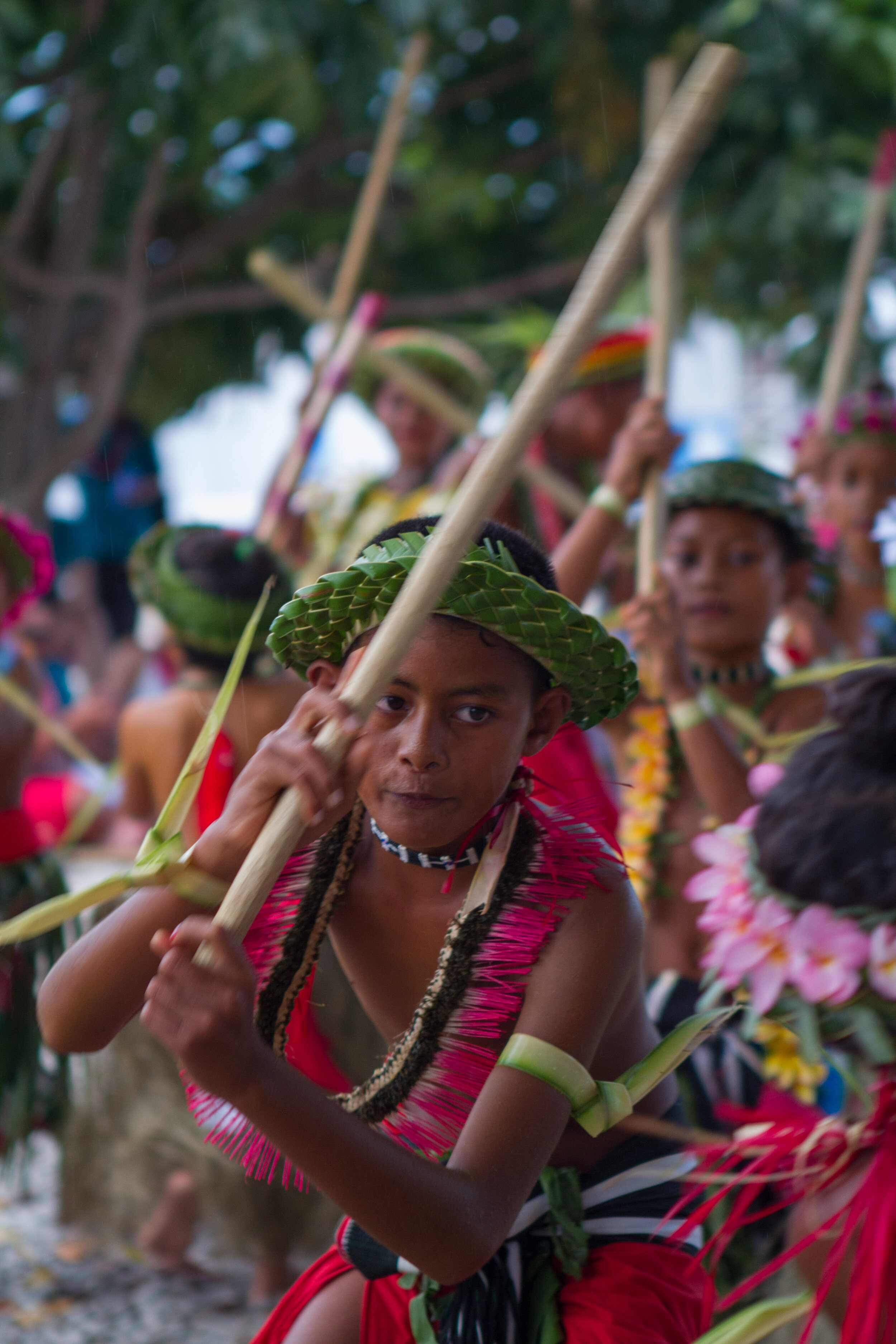Halad and Halalwech
Told by Stevana Dolmar on the island of Asor Island, Ulithi Atoll. Translated and edited by John Rulmal (Junior Magul).
Fiyong le ila sihasi mo wol, Asor, le Stevana Dolmar mele ye fiyongo ngal gich
Stevana said that this story teaches the importance of respect, patience and paying close attention so you don’t miss what is of value.
Ulithian
Muswe muswe, ngo ye mel semel mal le rema sor bo Halad mela idal, ngo ye wol mel semel fafel le Halalwech idal. Halad le lol semel tamol yi fulu we. Rema mel lal sew faal. Rewe ma taol chog fael talum, Hasulu mela kamadidial yi Halad. Halalwech ye wol kamadidi ngo lol chog yi chol fulu we. Iwe sa milmil ye— la fodow loeg meram, yong sa sor bo fafel rebe ma hamad, lefecheg sa kakdi bo Halad yebe faag riil luwulur yiir lefechig kawe. Bidi semel hasidi yal hamad, te dipily. Loagloag ye— tar be rubong hare solbong. Sela bidi Halalwech sa segilong mongoi we, yoeng Halad sa segi wey mo rawe serae. Halad te komahoy loeg yi mongoi we mao Halalwech. Yewe yi sa log, sa hasi tapiy we yal, sa bidag.
Yewe la seral wol miril sela bidag lol tamolel Fedrai, sa hasi Halalwech bo riil. Yewe sa hasi yimekawe lital, sa derdi lugul fal we, ngo ie sa moch kalwey, sela wiri ie lefechig we. Sa kasiaer yiir mal fal we, “Meyae lefechig laey sa dedabeydiy remetelai?”
“Yak! Yi lay metawe hasi dog tapial molwe halam, ngo gel sa hatagche wey mo fal we raelwe serae.”
Yadwe sa hasi fafel we, sa log, ngo ie sa sudag, sa hapungpung fedal lal yi fal we. Sa budog hatewas fedal, hatewas fedal.
“Aey, bele tewas molwe falech!”
“Habidag irel moelwe imal Yolfad habelae maridi bo sa yi chog mele be hapalaho yaremtale.”
Yewe sa hamedadag yi tarmal we. La bidag irel moelwe imal Yolfad.
“Yolfad!” Ngo ye magudgud yi paol mengar we. “Yolfad!” Ngo ye magudgud yi poel mengar we. Tooar mele yi wiri. Iewe ngo yesa tefal. Sa hamed tefaly.
“Hale! Ifasengal le bele towas fal le.”
“Tor yarmat!”
“Tefal dag le ye mel yarimata.”
Sawol hamedadag, sela fasngu tefaly Yolfad. Yong ruwow poer sa chobfungal. Fasngu tefaly, yong sa wol chob fengal yi poer we. Sa wol tefaldi.
“Hale, bele tewas fal le! Gel, ngo ila lapal yam bidag moa bidi. Yemel iae remtawe?”
“Tamel remetawe.”
“Tor mele ye magudgud?”
“Yadwe yibidag metamo, iewe ngo sew poel mengar mele magudgud. Yewe iela wol bidah, ngo ruwow poer mele yechochoab fengal.”
“Hoble bidah, ngo tetugul sew faormel le magudgud, sa hasi sew faes hobe halifdiy ngaliy.”
Sa bidag machwe. Hamedadag yi yaelwich tarmal we. “Yolfad?”. Iewe ngo yemel semael kolong woal yiim we imwal. Yema chem wol yi yiim we imwal, yebe fesaengu moelwe idal. Iwe ngo wol chem yi kolong we. Sa hatagche yi faes we, sa lifdiy ngal yi kolong iwe ngo ye moemael laog, sela suy loag.
“Medae moeloe?”
“Hola bidiy boa yeble towas moeloe faalech.”
“Boa?”
“Sa song Halad boa Halalwech le resa hasi.”
“Aey, hale buyey, bo ible buyey.”
Iewe ngo ye hasi botow we yal, sa marirdi. Labidiy, chil lolog yi hapungpung we yal yi Halad mo lal yi fal we.
“Aei meda melwe?”
“Ie song ngal Halalwech.”
“Hapalagoi hapungpung lae yam bo igela sa ble halgo sew hachulop. Aei, fegafei mele bele hatedog togog!”
Resa medar yalwich, resela hatedog togog. La lebong resa hasu dagey barog we. La barog su te momai mele wululul iyang. La barog maroro te momai mele wululul iyang. Yadwe rela barog wow, iyang aaya – yela yadel sa leferal log iyang. Aaya siya hama wow we, sa budog wow, wow ye – hasigsig ye – la yam yi wow we.
Molwe iewengo yir resa fasul mwalilidi bo yir rebele bidi, rebe hachulop ngalir yi fulu we sew. Yiir rewol kamam, ngo yiir rewol kamam hasigsig ye – la hala yi yadwe reble chui iyang. Iewe ngo kamadidial termal we Halad le be buyoi ma tarfisfis log molwe giil irel yal, semel termal kamadidi.
Iewe resa buyoi resela hasi Sae we sa log ye– rela hola yi falu we. Sa log yi barog we, yong yi fafel moelwe fulal Halad we yi tedipli, yi melwoi mo metal woy yarmat bo yar yi barog we. Bo yi chol yi fulu we. Sa dildil ye– sa wodu ngalichog yifafel we tabol irae we, ngo yi sela hamochu hemoyu. Ie we chog ngo ye wodgidag yi tabol irae we wol yeferal sa hayefra sa bidichog nog ye sa chu Sae we, sa tefal ngal fulyar. Yewe yi sa teykof depal irel molwe metamo sa hafalpeche yiremetawe mokwe yi sa farngali bo yi tuwiri yi molwe.
Iwe sa titi mata mayo mayo.
English
A long, long time ago there lived a prince named Halad and a woman named Halalwech. Halad lived in a men’s house that had a mosquito net. He was very handsome, and Halalwech was a beautiful woman. When the time came for Halad to choose a wife, it was decided that the eligible women would take it in turns to cook for him, and he would decide which woman to marry. Each time a woman brought him the food she had prepared, Halad did not approve, and the woman would leave. This went on for two or three days. When it was her turn, Halalwech went with the food she had prepared and put it in the doorway. Halad pushed it out the door on the opposite side of the house, taking no notice of the food or of who had made and brought it. Halalwech then walked around the house, picked up her plate, and went home.
“Halalwech went with the food she had prepared and put it in the doorway”
But one day the prince of Fedrai arrived to take Halalwech as his wife. Halalwech gathered her belongings and followed him. As she passed by the men’s house, Halad noticed her leaving. He asked the other men in the house who the woman following that man was.
“Oh! That’s the woman who brought you a plate of food that one day, but you threw it out the door on the other side of the house,” they replied. When the man left with Halalwech, Halad started screaming and crashing around in the men’s house. The house was about to be destroyed. One of the boys was sent to go and call Yolfad so that he could stop the destruction.
When the boy arrived at Yolfad’s house he called, “Yolfad!” No one answered, but the palm of a young coconut was shaking. “Yolfad!” he called again, but the coconut palm continued shaking. Seeing nothing else, he ran back. The men in the house said that if Yolfad did not show up, the men’s house was going to be destroyed. “Nobody’s there,” the boy replied. He was asked to run back again, so he ran back and called Yolfad again. There was no response but the clack of two dangling coconut shells hitting each other. He called again but still there was no reply except the two shells hitting each other. “You have gone twice, and no one was home?” they asked. “Anything moving?”
The boy replied, “The first time I went, a young coconut leaf was shaking. The second time I went, two coconut shells were banging together.”
“Go back again,” they told him, “And if you see anything move, take a rock and throw it at the source.”
So the boy ran back to the house again and called out, “Yolfad?”
At this time, the spirit Yolfad had turned himself into a plover (kolong) and perched on the roof of his house. The boy, seeing movement, threw a rock at the plover, and all of a sudden, the spirit Yolfad was standing beside him. The spirit asked what was wrong, and the boy told him that the men’s house would be destroyed if he did not come to put a stop to it. He told Yolfad that Halad was furious because Halalwech was taken away. “Go back. I am coming,” said Yolfad.
Yalofad grabbed his basket and off he went. The commotion was still going on at the men’s house. He asked Halad what the problem was, and Halad told him he was angry with Halalwech.
“Stop the commotion for today. We will hold a feast,” said Yolfad. Dance practice was to begin that evening, so Yolfad ordered the boys and the younger kids to bring dried coconut shells to make the fire. In the evening, the men lit the fire, and practice began. Starting with the standing dance, Halad did not look good. They tried the sitting dance, but again Halad did not look good. When they tried the stick dance, he looked good as if he had already rehearsed. They practiced and practiced the stick dance until it was perfect.
They informed the island with Halalwech that they were coming for the feast and dance competition. At this time, Halad had beautified himself so that his skin sparkled and shone, and he looked very handsome.
They took a canoe and sailed to the island. After they arrived, the dancing began. Halalwech was sitting up front because the dance was from her island. During the dance Halad pointed his dance stick toward Halalwech. She grabbed it and would not let go. Putting the stick on his shoulder, he picked up Halalwech, and they went to the waiting canoe and returned home. Feeling very sorry about what had happened, he apologized to Halalwech for his disrespectful actions, saying it was all his fault for not noticing her before.
Iwe sa titi mata mayo mayo!



